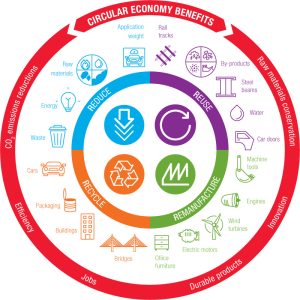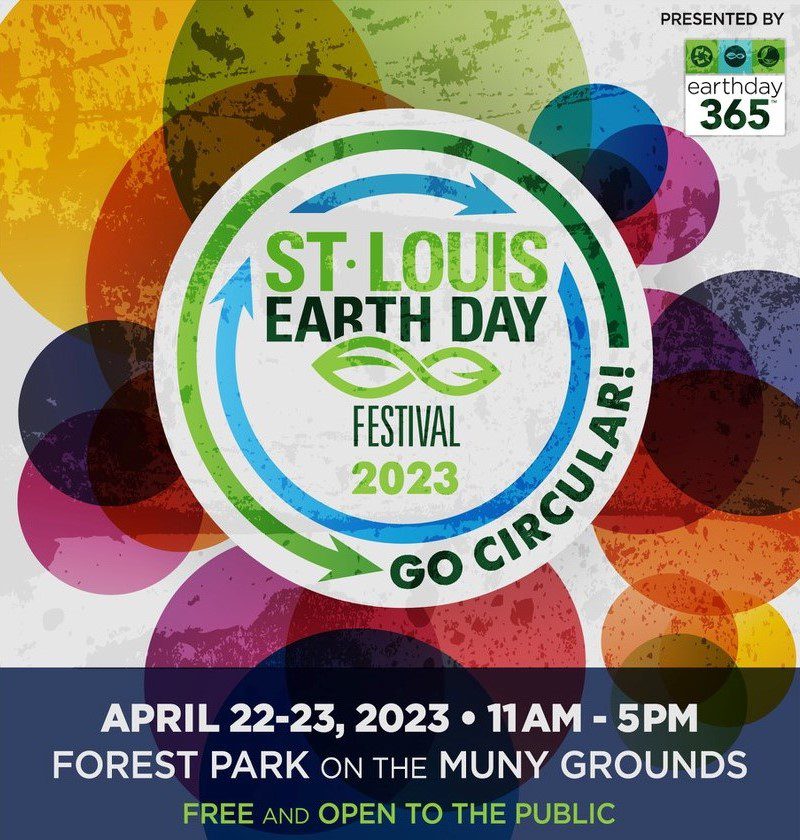Circularity
It’s more than recycling
This year, the sustainability awards at the St. Louis Earth Day Festival will include a new category—Circularity in Business—and nominations for the award are now open through March 31, 2023! Click here to submit your nomination.
What does circularity in business mean? Circularity is the practice of keeping something in use—and out of the landfill—over and over. So any business that keeps materials or objects in the supply chain—through recycling, reuse, resale, or repair—is practicing circularity. In fact, circularity can make your home safer and decrease utility bills. It can help stop litter and illegal dumping. And it can prevent landfills and incinerators from being built near homes and schools.
Reuse
 Reusable containers and tableware can be used many times, resulting in less single-use waste that litters our streets and ends up in landfills. Who wouldn’t want to live in a neighborhood without cups, wrappers, and plastic bags littering the ground? Many businesses give discounts for the use of reusable cups, or use reusable tableware that reduces the amount of single-use waste that can become litter. This can also mean fewer landfills and trash incinerators, which no one wants to live near. In fact, residents in Valley Park, MO overwhelmed a city council meeting, forcing the developers of a proposed trash combustor and incinerator facility to temporarily withdraw their application.
Reusable containers and tableware can be used many times, resulting in less single-use waste that litters our streets and ends up in landfills. Who wouldn’t want to live in a neighborhood without cups, wrappers, and plastic bags littering the ground? Many businesses give discounts for the use of reusable cups, or use reusable tableware that reduces the amount of single-use waste that can become litter. This can also mean fewer landfills and trash incinerators, which no one wants to live near. In fact, residents in Valley Park, MO overwhelmed a city council meeting, forcing the developers of a proposed trash combustor and incinerator facility to temporarily withdraw their application.
Resale

2022 Green Works Here Award Winner – Home Sweet Home
Businesses and nonprofits that resell/re-home furniture and other items not only help keep waste out of landfills but also can reduce illegal dumping. Last year’s winner of the Green Works Here! Award at the St. Louis Earth Day Festival, Home Sweet Home, is a furniture bank that serves clients who live in low-income housing or receive extended social services. Because almost all of their furniture and household items have been donated, Home Sweet Home diverted more than 700,000 pounds of furniture from landfills in 2021 – a great example of circularity in business.
Repair
Repairing electronics, tools, and machines reduces the amount of raw materials mined, which can involve human rights violations and environmental concerns. Manufacturers that have circularity in mind create products that are more easily repaired, and they provide the tools, information, and parts that consumers will need to fix them. Instead of discarding an item that may have only a single broken part, such as a phone with a cracked screen, a consumer in a circular system would be able to repair it.
Renewable Energy and Energy Efficiency
Renewable energy projects can foster a circular system, although at the moment a lot of renewable energy infrastructure is still linear. While nonrenewable energy relies on fossil fuels extracted from the earth and produces waste emissions, renewable energy is a potentially endless supply resulting from naturally occurring sources. Renewable energy can reduce the impacts of climate change and also reduce air pollution, which has negative health effects for people in our region. ‘Circularity’ also means more efficient use of resources, including making buildings more energy efficient, which saves residents money on their utility bills.
There are even more ways for businesses to promote circularity than are listed here. For example, in a circular system, biodegradable waste is not landfilled, but composted and becomes useful fertilizer. Wastewater can be collected and reused. Building materials can be reused. Circularity offers endless opportunities for innovation.

2022 Green Works Here Award Winner – Home Sweet Home
Supporting and recognizing businesses that promote practices like reuse, resale, and repair will help make circularity more commonplace. In addition to Home Sweet Home, other nominees for the 2022 Green Works Here! Award who deserve a standing ovation include the Midwest Recycling Center, Dharma+Dwell, Forrest Keeling Nursery, Perennial City Composting, and Focal Pointe Outdoor Solutions, Inc.
Help promote circularity in St. Louis by filling out this simple form to nominate a business for the ‘Circularity in Business’ Award by March 31, 2023.
Read more about the circular economy on the Ellen MacArthur Foundation website.



